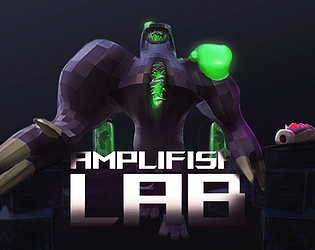Published on 2024-07-28 22:33 by Jo Colomban
Overview
Amplifish is a first person action game developed during the first group project in my Game Programming education at FutureGames Malmö. It was developed over 2.5 weeks with a team of 4 programmers, 6 artists, and 2 designers. I acted as programming lead, helping my teammates get past blockers and designing the game’s architecture.
Feature highlight: powerup system
One of the game’s main mechanics is the ability to consume an enemy and get a powerup based on the type of enemy for a certain amount of time. To implement the feature, I tried to take a very modular approach to guarantee easy expendability, allowing the team to easily implement new powerups if the time allowed it. A parent “PowerUp” abstract class implements all the methods the player needs to interface with.
public abstract class Powerup : MonoBehaviour {
[SerializeField] protected Color powerupColor;
[SerializeField] protected float timeToLive = 10f;
public abstract Powerup Use(GameObject enemyHit);
public abstract void Deactivate();
public Color GetPowerupColor() {
return powerupColor;
}
public float GetTimeToLive() {
return timeToLive;
}
}To create a powerup, a programmer can simply extend this class, setting up a few variables and coding its behavior in an override of the Use method, like in the StrenghtPowerup below
public class StrenghtPowerup : Powerup {
private DamageTrigger damageDealer;
private AudioSource audioSource;
private void Awake() {
audioSource = gameObject.AddComponent<AudioSource>();
/*** code that sets up audio for the powerup use omitted***/
powerupColor = new Color(1, 0, 0);
damageDealer = gameObject.GetComponent<DamageTrigger>();
if(!damageDealer)
Debug.LogError("Missing DamageDelear component! Make sure to add it to the player prefab");
}
public override Powerup Use(GameObject enemyHit) {
audioSource.Play();
damageDealer.ToggleIncreasedDamage(true);
return null;
}
public override void Deactivate() {
audioSource.Stop();
damageDealer.ToggleIncreasedDamage(false);
Destroy(this);
}
}With the code structured in this way, the Player just needs to have a reference to the current powerup, and polymorphically call the correct Use method on it on player input.
Written by Jo Colomban
← Back to blog

